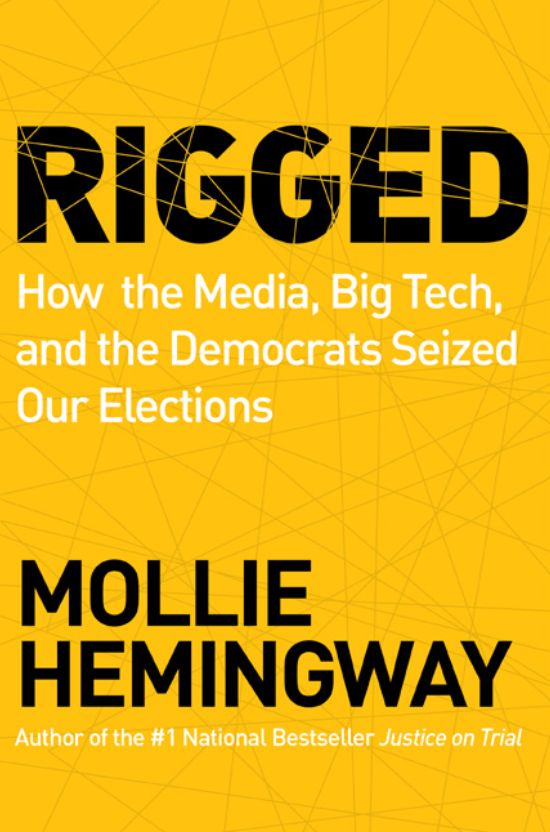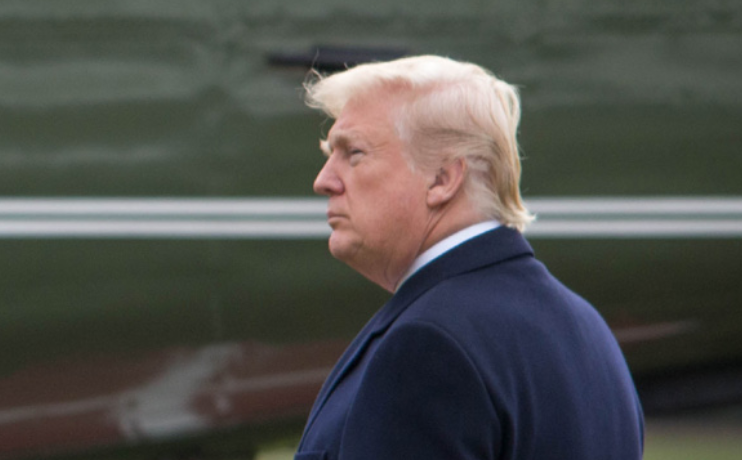Q&A: The ‘weirdest election of our lifetimes’
American Experiment’s John Hinderaker interviews journalist Mollie Hemingway about the irregularities of the 2020 election.
Mollie, when did you decide to write a book about the 2020 election?
Shortly after the 2020 election. I knew almost immediately that there was something weird about how the leftist media would not let anyone talk openly about what was the most controversial election of our lifetimes. And it kept bothering me, so I knew I had to do a deep dive into the 2020 election. I wanted to look at how our corporate media had moved from mere bias into outright and dangerous propaganda; how they worked with tech companies to suppress really important news stories that were relevant to the voters. I had seen how election laws and election processes were changed throughout the country, sometimes by legislatures, which should be according to our Constitution, and sometimes not. And I wanted to look at the way the courts handled disputes about elections. I knew the issue wasn’t going away and I needed to research it and write about it.
The title of your book is Rigged: How the Media, Big Tech and the Democrats Seized our Elections. What were the key issues that emerged in connection with the 2020 election?

Take the media first. I’ve been disturbed by how the media have become more out-front in their propaganda, which I think is dangerous. During the Trump administration, the media pushed a dangerous and delusional conspiracy theory that Donald Trump was a traitor who had colluded with Russia to steal the 2016 election. And I saw how awful that was for the country and how it was weaponized by our law enforcement.
I think in 2020, the media would do whatever it took to keep Donald Trump from being reelected. That’s not journalism. It’s advocacy; it’s dangerous propaganda. We saw how they covered the Coronavirus. In the eyes of the media, it was Donald Trump’s fault. Now, when things are actually quite bad under Biden, they don’t blame him for anything. And they elevate news stories that help Biden. They basically ran the Biden campaign for him. They allowed him to stay in his home in Delaware while they pushed his messages, asked him gentle questions, and attacked his opponent. They kept him out of the limelight so that he wouldn’t be as disliked as he has become.
One fundamental thing they did was conceal that the man suffers from dementia and is in no shape to be president. That should have been a major story, shouldn’t it?
I’m not a doctor. I don’t know what his particular health situation is, but he’s clearly an older individual. All of us will probably experience some decline if we are blessed to make it to his age. That would have been reasonable to cover for journalists. They made up ailments for Trump that they covered hysterically for years, but here you have an actual thing that everybody’s witnessing, and nobody was allowed to talk about it. I will say that the media used to make fun of Biden as a bumbling speaker, but now that he has deteriorated, they try to contextualize what he’s saying. I recently saw a media report say, “here’s what Biden said.” And then, “here’s what he probably meant to say.” This is not the treatment that you will see for a Republican politician.
The title of your book mentions big tech as well. What did you conclude there?
That is such an important part of how elections are rigged in this country. The major tech companies have control over what information people get, and they set algorithms. They’re staffed almost exclusively by leftist employees, the kind that are really on the fringe. They set algorithms to suppress conservative content and elevate leftist content. When people type terms into search engines, they think they’re getting an honest result of what’s out there on the internet. That is not the case, particularly with Google, where they have complicated algorithms designed to direct people into particular actions based on their response. So they will suppress pro-life content and elevate pro-abortion content. They will suppress Republican candidate content and elevate leftist content. And we’re not even talking about the actual election meddling of Twitter and Facebook, where they came in, and they censored political content from one party and not the other. These things directly affect how people vote. The media and tech colluded together in suppressing the Hunter Biden story. The propaganda press refused to cover any information about the Biden family business, which is, of course, selling access to Biden. People usually don’t just give money for nothing in return. The media refused to cover it, and the tech companies suppressed those few media outlets that did cover it.

You mentioned how election procedures were changed. We’re sensitive to that here in Minnesota because we were one of the states in which there was collusive litigation involving a Democratic Secretary of State that had the effect of eliminating the witness signature requirement on mail-in ballots.
The way you’re supposed to change election laws and procedures is through the legislature. And if they didn’t have control of the legislature sometimes, they would sue a friendly state official and get them to settle in their favor. And they did that in multiple states to water down election security, maybe it was signature removing or degrading a signature match.
They sued and settled, or they would push through changes to make it easier to vote without any security. And I think it’s important that people remember the history of voting in this country, which has always been a tension between expanding the franchise and decreasing the fraud. This country has a long history of fraud that we have implemented procedures to try to avoid. And so one of the things that we learned over time was the importance of a secret ballot. A lot of what happens with mail-in balloting is removing that secrecy, whether it can be pressure from inside the home or from a union boss or other people in your life. We also had voter rolls that were tightly controlled so that we knew that people weren’t going from one precinct to another to duplicate vote. Now, most people who vote will not break the law, but a determined minority can affect elections significantly. And we learned that a lot of these changes that were pushed through, using the cover of the Coronavirus pandemic, were things that Democratic activists sought for a very long time. And they were finally able to push them through because of this hopefully once-in-a-lifetime situation. But the result is that people do not have confidence in the results of the election.
You write in your book about the way election processes were privatized by the left—how they inserted their own people into the actual conduct of the election. Talk about that a little.
Mark Zuckerberg funneled hundreds of millions of dollars through two left-wing groups that were staffed entirely by far-left activists to “help with the election” because of the pandemic. But that’s not what happened. The funds, in turn, were given to counties and cities with strings attached: They had to fund more leftist groups that would run the ballot, write the ballot, help with harvesting ballots, translating ballots, and finding volunteers. And so, what happened is these far-left activists were embedded into the election system, through the private funding of our election operations. This is the biggest thing that voters need to know about what happened in the 2020 election. This was explosive. The more I learned about it, I couldn’t believe how effective this was.
I think most people expect that elections are going to be run in an impartial way that will not favor one party over another. What happened in 2020 is like having the Green Bay Packers hire and pay the referees for a game against the Vikings. And then, no matter how messed up the calls, you can’t contest any of the results because it was fair and square. You cannot have one party privately funding and operating elections.
And they were very smart about where they did it. They like to say that they funded many cities — cities on the left and cities on the right. But what that meant would be that Philadelphia would get $10 million, and then a Republican county nearby would get $5,000. This was completely disparate. They were very smart about how they spent their money. They spent a lot of their funds in Georgia, Wisconsin, Pennsylvania, Arizona. These are states that flipped from being Republican states in 2016 to Democrat in 2020. And this is what people need to pay attention to. It is the most important thing that cannot be allowed to happen again. We’ve never run elections this way in our history. People need to realize how it was done so that they can craft legislation to ban it.
In the immediate aftermath of the 2020 election, there was much talk about many thousands of votes for Joe Biden appearing in the middle of the night, and these kinds of things. Did you look into some of those allegations?
I think part of the reason people distrust the results was that they were getting these weird reports about how people stopped counting for the night, but then they didn’t. And then you see these huge spikes in vote totals. The real issue here is that you had multiple places where they claimed they were stopping counting, and they weren’t. I did look into the situation in Atlanta. Fulton County is the largest county in Georgia and is notorious for having problems with election security. Local and national media reported that Fulton county was stopping counting; the overseers left, and it turned out that they hadn’t stopped counting. And because there was no proper oversight, it’s hard to know what happened during that time.
This also happened in Philadelphia, where overseers were not allowed to be within a good distance from the ballots. In some cases, they were like a football stadium’s length away from seeing what was happening. With so many mail-in ballots, it’s really important that you be able to check whether they are proper or not. If they’re not properly filled out, they’re not supposed to be counted. And if you don’t have independent oversight before the separation of the ballot from the envelope, once again, you cannot have confidence in the results of these elections.
As for electronic voting systems, I think a lot of people have had a problem with them for a long time, but there’s a difference between being susceptible to outside intervention and having evidence of outside intervention. I’m certainly open to hearing arguments to the contrary, but I just don’t see that as being how this was done. You look at how the Democratic party brags about how they won the election, and they don’t talk about it this way. They talk about it in terms of that privatized funding, of controlling news, or controlling tech, or even controlling the riots that took place throughout the country last year. These are things that we all witnessed and observed and are demonstrable facts.
It seems to me we’ve all just gotten accustomed to a sort of looseness in the system, a lack of security and accountability. And it shows up in things like ballot harvesting, which was kind of a scandal when it first came along, and now it seems like it just gets worse and worse.
Exactly. These drop boxes are either unsupervised or poorly supervised. And the paperwork that is supposed to give you confidence in how they’re supervised is frequently lacking or missing. I don’t think people realize that two commissioners in Fulton county, Georgia refused to certify the election results for the 2016 general election, in part because of concerns over the lack of integrity associated with ballot harvesting. They kept asking for the paperwork that showed that the ballots had been properly transferred, but they weren’t given the paperwork and particularly not given the paperwork in a timely fashion. All of these things are means by which fraud can occur. There is a reason why throughout history, people have understood that mail-in balloting is the primary means by which fraud can occur. It just stands to reason. It’s been determined by bipartisan groups. France banned mail-in voting in the ‘70s because they knew that it was susceptible to fraud.
The more we expand that, particularly without the accompanying protections, the more we’re asking for trouble in so many ways. We don’t keep clean voter rolls. There are millions of people registered in multiple states. Ballot harvesting — what I referenced earlier as one of the problems with getting away from a secret ballot — brings in an outside party to potentially mishandle your ballot. Or maybe there’s pressure to make sure that you have voted the right way before they will handle your ballot and turn it in. And polls show that a significant majority of Americans oppose private ballot trafficking. Yet you see it in multiple states.
Are we going to see the same thing in 2022 that we saw in 2020?
2020 was partly because of the unique hatred for one candidate in particular. But the means they used caused, in some cases, permanent changes to the system. And the hatred for Trump gets displaced onto hatred for the next person who stands in the way of the left’s agenda. So these problems will continue until people clean up their voting systems. It’s important that both winners and losers agree with the results of the process. And so it is important that people come to agreement on how our voting should happen. Some states have done a better job than others. I want to point out that Pennsylvania brought in mail-in voting with hardly any scrutiny for how it would affect their process. They did that the year before the 2020 election. Well, now I think they are aware of how changes to election laws and processes can have bad effects. And so I’m glad that people are aware of the importance of election integrity, so they can fight for it going forward.
Mollie Ziegler Hemingway is a senior editor at The Federalist and a senior journalism fellow at Hillsdale College. A Fox News contributor, she is a regular member of the Fox News All-Stars panel on “Special Report with Bret Baier.” Her work has appeared in the Wall Street Journal, USA Today, the Los Angeles Times, the Guardian, the Washington Post, CNN, National Review, GetReligion, Ricochet, Christianity Today, Federal Times, Radio & Records, and many other publications. Mollie was a 2004 recipient of a Phillips Foundation Journalism Fellowship, a 2014 Lincoln Fellow of the Claremont Institute, and a 2021 recipient of the Bradley Prize. She is the co-author of the book Justice on Trial: The Kavanaugh Confirmation and the Future of the Court.

Mollie Hemingway will be the featured speaker at American Experiment’s Fall Briefing, 7-9 PM, Tuesday, October 19, at the The Winery at Sovereign Estate, 9950 North Shore Road. Waconia. Admission is $125. For more information, contact Kathryn at [email protected] or (612) 428-7005.